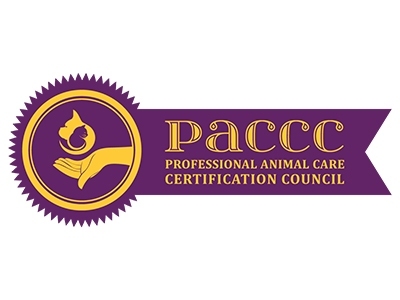Dr Kang Nee of cheerfuldogs.com is among the first 35 CPACPs certified by The Professional Animal Care Certification Council.
Source: Pet Product News
New York-based Professional Animal Care Certification Council (PACCC) announced that the first independent certifications for Certified Professional Animal Care Provider (CPACP) have been awarded to 35 pet care professionals located from coast to coast in the U.S. and in Canada, as well as in Singapore.
The first certification exams testing the comprehensive knowledge of professionals in charge of the daily handling of the animals of a professional pet care business, overseeing every aspect of an animal’s well-being while in their care, were conducted by third-party Professional Testing Corp. To initially qualify to take the CPACP exam, applicants had to meet minimum education requirements, have a minimum of 500 hours of experience and provide letters of reference from veterinarians and other pet care industry professionals. The in-depth, 125-question examination covered such animal care topics as health, nutrition, dog fight and bite protocol, on-leash and off-leash interaction, sanitation, dog behavior and temperament, dog body language, dog training, animal and handler safety, vaccination protocol, workflow management, pathogen control, emergency and quarantine protocols, air quality standards and staff management expectations.
“This industry is booming, and finding a pet care provider is easier than ever, but that ease does not equate to safety,” said Susan Briggs PACCC co-founder. “These independent certifications now bring the pet care services industry to the forefront of professional care, and CPACP credentials will help pet parents identify the most qualified professionals to care for their pets.”
Certification as a CPACP is good for three years, at which time retesting or completion of 20 hours of continuing education is required to maintain certified status. The next opportunity for pet care professionals to take the CPACP exams will be before or during March 2017. While the number of those currently certified by PACCC is limited, Briggs encourages pet parents to ask their pet care providers about certification.
“We could not be more proud of these pet care pioneers who took the very first CPACP exam,” said Briggs. “For an industry frequently damaged by news reports of serious pet accidents and deaths, they are on the cutting edge of pet safety and, without a doubt, by their personal abilities and by their example, they will ultimately help make all pets safer.”
The 35 newly certified pet care professionals are located in Alaska, British Columbia, California, Florida, Maryland, Massachusetts, Michigan, New Brunswick, New York, Ohio, Rhode Island, Singapore, South Carolina, Texas and Wisconsin.
For more information, visit https://paccert.org.

